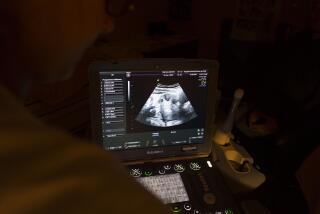New, Expensive Birth Control Implant Gets Slow Acceptance
- Share via
Diane Lesher became part of a select group Wednesday: San Diego women who have opted for Norplant, a birth control method they can forget about for the next five years.
“For me it’s a good method,” said Lesher, 35. “I don’t have any children, and that’s still a possibility down the road. That’s why I chose this, as a matter of fact.”
Lesher obtained Norplant from Planned Parenthood, one of the few places where San Diego women whose health insurance does not cover birth control will be able to obtain Norplant at a relatively low cost.
As private physicians in San Diego wait cautiously to see if there is a demand for the expensive new device, the family planning agency is gearing up for a program to make it more easily available.
Women are being asked by Planned Parenthood to sign up to participate in no-cost sessions at which doctors will be trained to insert Norplant, as well as for insertions after training is complete.
“To me, the whole point of Norplant, and what makes it really exciting, is that we’re giving women another option for family planning,” said Lenore Lowe, director of communications for the agency. “We aggressively pursued having this. We sought out Wyeth (the manufacturer) because we really wanted it.”
Norplant was approved by the U.S. Food and Drug Administration in December.
It took just a few minutes for Dr. Katharine Sheehan to place Norplant’s six matchstick-size, silicon tubes under the skin of Lesher’s upper arm Wednesday.
First, the inside surface of Lesher’s skin was numbed by injection. Then Sheehan inserted a hollow metal rod underneath the skin, and slipped the first tiny tube of contraceptive hormone inside. A metal plunger pushed the tube into place, and Sheehan was ready to implant the next tube.
Now, for up to five years, the tubes will prevent pregnancy by releasing a low level of the hormone progestin into Lesher’s bloodstream.
“She should be protected within 24 hours,” Sheehan said.
But her fertility will return almost immediately after the tubes are removed.
At the heart of the limited availability of Norplant is the device’s cost.
San Diego gynecologists appear to be opting for a charge of $600 to $700 for the device and its insertion, said Jeffrey Jones, a sales and training representative for Wyeth-Ayerst Laboratories, Norplant’s maker. But even Planned Parenthood’s price tag won’t be small--at $450, rock-bottom by Norplant standards.
That compares favorably to the $600 to $900 for a five-year supply of birth control pills.
But women don’t have assurance that their health plans will cover Norplant. Norplant is classified by the FDA as a drug, so insurance coverage of drugs should cover it--unless the plan excludes birth control.
Norplant’s up-front cost even has the health maintenance organization Kaiser Permanente developing creative ways to recoup some of the money.
Beginning next year, Kaiser members who have drug coverage will be charged their drug-plan deductible for every month of Norplant’s useful life, up to a maximum of $200, said spokesman Jim McBride. So, if a woman normally has a $2 co-payment on drugs, she would pay $120 for her Norplant.
For other insurers, coverage is spotty enough that Wyeth-Ayerst has an 800-number hot line for doctors to sort things out.
Still, gynecologists are moving very slowly to be trained to insert Norplant. At sessions run by UC San Diego faculty the past six weeks, only 25 to 40 doctors have been trained, said spokeswoman Nancy Stringer.
Wyeth-Ayerst spokesmen did not respond to requests for figures on how many Norplants have been implanted in San Diego County.
Dr. Allan Silver, chairman of obstetrics and gynecology at Scripps Memorial Hospital-La Jolla, said price is an issue, but he thinks physicians are being cautious simply because Norplant is new.
“It’s a type of birth control that is not easily reversible. It’s an operative procedure to remove it,” Silver said. “And there are side effects, like excessive menstrual bleeding. Most women don’t tolerate that very well.”
Silver said he has not been trained to insert Norplant. “I really have not found patients in my practice that this would be good for, nor that have come to me and said this is something they really want,” he said.
Planned Parenthood has given Norplants to about two dozen San Diego-area women so far. The agency hopes to eventually have the method available for as many of the agency’s 60,000 clients a year who want it, Lowe said.
But reimbursement will remain an issue even for Planned Parenthood, she acknowledged.
Medi-Cal officials appear undecided about reimbursing the clinics for the $350 cost of the device itself, particularly with the state in financial trouble, Lowe said.
But she remains enthusiastic.
“Women always ask, if we can put a man on the moon, why can’t we get a really good method of birth control? And this is certainly moving in that direction,” Lowe said.
More to Read
Sign up for Essential California
The most important California stories and recommendations in your inbox every morning.
You may occasionally receive promotional content from the Los Angeles Times.













